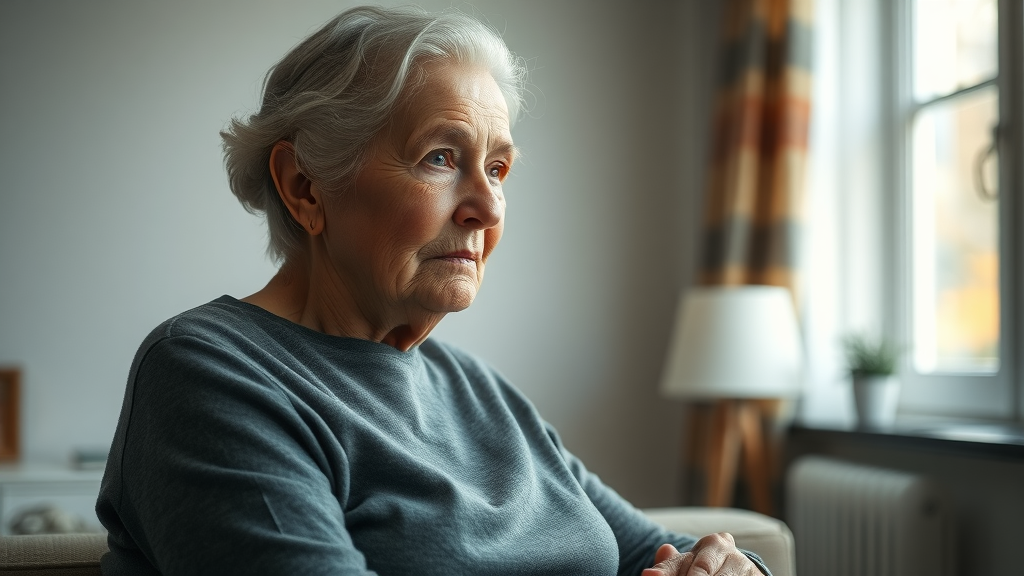Did you know nearly one in three older adults struggle with loneliness after retiring? It’s a startling truth that highlights how deeply mental health in retirement shapes our golden years. While retirement is often pictured as a reward—finally a chance to relax and enjoy life—many discover this major life change also opens the door to unexpected feelings of isolation and anxiety. But here’s the good news: with understanding and practical action, loneliness can be transformed into lasting connection, purpose, and wellbeing. Read on to discover how to protect and strengthen your mental health in retirement—and why it matters so much now.
The Startling Truth: Mental Health in Retirement and the Epidemic of Loneliness Among Older Adults

- Recent studies reveal that nearly one in three older adults struggle with loneliness after the retirement transition, highlighting the critical need to prioritize mental health in retirement.
What You’ll Learn About Mental Health in Retirement
- Discover the impact of retirement transition on mental health
- Explore the mental health challenges and solutions for retirees
- Understand why older adult populations are vulnerable to loneliness
- Learn actionable strategies to prevent retirement depression and mental health problems
| Problem | Percentage of Older Adults Affected |
|---|---|
| Loneliness | 30% |
| Anxiety | 18% |
| Depression | 16% |
| Cognitive decline | 12% |
Mental Health in Retirement: Navigating the Challenges of the Retirement Transition

The retirement transition marks a major life event for every older adult. For some, the absence of workplace responsibilities feels liberating. For others, it can feel unsettling as daily structure fades away. Research shows that this period is often accompanied by increased vulnerability to mental health problems—especially anxiety and retirement depression—as old routines give way to an open, sometimes empty, schedule. Without the social life and sense of purpose that work provides, many older adults find themselves isolated, unsure how to fill their days, and at greater risk for declining mental health.
Adjusting to retirement also means adjusting to a new emotional landscape. The shift from busy, productive days to quiet reflection can sometimes make you feel cut off from colleagues, friends, or family. Physical health issues may surface more acutely as movement decreases and energy levels shift. It’s crucial to acknowledge that this transition is not simply a lifestyle change—it can be a public health concern, given how mental and physical health are intertwined in the aging population. Proactive strategies are essential to support mental wellbeing during this crucial phase of life.
How the Shift from Work Impacts the Mental Health of Older Adults
- Loss of daily structure
- Reduced social interactions
- Increased vulnerability to mental health problems
- Heightened risk for health problems and declining physical activity
“Retirement is more than an end—it’s the beginning of a new emotional landscape that requires intentional support for mental health.”
Retirement and the Aging Population: Why Mental Health in Retirement Matters More Than Ever
Connecting Mental Health, Loneliness, and the Health Problems of Older Adults
- Understanding the intersection of mental health problems and physical health issues
- The dual burden: health problems that arise from social isolation
- Trends among the aging population and implications for long-term wellbeing

Today’s aging population is growing faster than ever, making mental health in retirement a matter of public health urgency. As people live longer, the risk of both mental and physical health problems increases, especially when social networks shrink. Loneliness is not just an emotional state—it can lead to depression, worsen chronic health issues, and speed up cognitive decline. For many older adults, social isolation becomes a real threat during retirement transition, compounding health problems that were once manageable.
Communities and health systems must recognize the dual burden that mental health and physical health issues place on older adults. Long-term wellbeing depends on addressing both, and recent research from the National Institute on Aging supports the need for early, sustained interventions. The quality of retirement years hinges not just on medical care, but on meaningful connection and support within the local community, family, and social life.
“As people live longer, the challenge is not only to increase lifespan but to improve the quality of those later years through robust mental health support.”
Early Retirement: A Double-Edged Sword for Mental Health
The Psychological Impact of Early Retirement on Older Adults
- Financial stress vs. anticipated freedom
- Risks of losing identity and purpose
- Early retirement and its connection to increased mental health problems

While the allure of early retirement is strong—more freedom, less stress, extra time for hobbies—it’s not without risks, especially for mental health in retirement. Many retirees are unprepared for the loss of identity that comes with leaving the workforce earlier than the traditional retirement age. The end of a long-held career can bring unexpected strains on mental wellbeing, and for some, financial stress replaces the anxieties once tied to work. When routines vanish and social networks fade, retirees often find themselves facing new mental health problems like anxiety and depression.
It’s essential to recognize that early retirement doesn’t guarantee happiness. The loss of daily purpose and social identity, combined with unanticipated health issues or financial worries, can make you feel lost. In fact, evidence suggests early retirement may increase the risk of cognitive decline and other health problems if not approached thoughtfully. But with the right strategies—including social connection, routine, and professional support—these risks can be managed and even turned into opportunities for new fulfillment.
Lessons from Early Retirement: How to Mitigate Mental Health Challenges
- Stay socially active
- Establish a routine
- Volunteer or find new passions
- Seek professional support for mental health
Strategies for Protecting Mental Health in Retirement: Practical Actions for Older Adults
Combating Loneliness and Retirement Depression
- Building and maintaining new social connections
- Embracing lifelong learning
- Prioritizing mental health check-ups

Practical steps are the antidote to loneliness and retirement depression. One powerful approach is to proactively build new social circles—even if old friends have moved away or drifted apart. Community centers, local clubs, or online groups can reignite your social life and offer fresh connections. Embracing lifelong learning, through classes or hobbies, keeps the mind sharp and spirits high. Routine mental health check-ups—much like regular physical doctors’ visits—help catch issues early and keep both mental and physical health in balance.
It’s important to recognize that mental health is not separate from overall wellbeing. Every older adult can benefit from integrating these practical strategies into daily life, making each day purposeful and engaged. This focus on prevention and connection is essential for thriving after the retirement transition, no matter your age.
Physical Activity: Vital for Both Mental Health and Physical Health Problems
- How regular movement supports mental health
- Community classes and group exercise for better engagement

Physical activity is a cornerstone for both mental health and physical wellbeing in retirement. Regular movement not only supports healthy joints and cardiovascular health, but it also dramatically reduces stress and depression. Studies show that older adults who participate in community classes or group exercise are less likely to feel isolated, and more likely to experience gains across both mental and physical health problems.
Exercise fosters a positive environment for building friendships and helps maintain energy levels, even as the years advance. Whether it’s gentle yoga, walking groups, or dancing, the act of moving with others breaks barriers of loneliness and adds enjoyment to daily life. Physical activity is not just about extending your lifespan—it’s about infusing each day with meaning, connection, and purpose for the aging population.
The Retirement Transition and Mental Health: How Families and Communities Can Help
Family Support and Open Dialogue for Older Adults
- Meaningful conversations about purpose and goals
- Encouraging social inclusion in family activities
- Recognizing signs of mental health problems and retirement depression
No one should have to navigate the challenges of retirement transition alone. Family members can play a transformative role by having open, supportive conversations about goals, dreams, and purpose after work. Creating inclusive family activities not only helps older adults stay engaged but also serves as a buffer against loneliness and declining mental health. Being vigilant for signs of depression, mood changes, or withdrawal is essential to ensuring loved ones do not suffer in silence.
The support of family and friends during retirement can provide emotional grounding and motivation for staying active and connected. A strong family network is critical for detecting symptoms of depression and other health issues, bridging the gap between older adults and the help they might need. When families foster dialogue about mental health, they help dismantle stigma and encourage healthy, open communication.
Community Programs and Their Role in Promoting Mental Health in Retirement
- Local initiatives to connect retirees
- Mental health resources specifically designed for the older adult population

Local community initiatives like senior centers, volunteer programs, and group activities are powerful tools for improving mental health in retirement . Many towns now offer resources tailored specifically for older adults, from mental health support groups to lifelong learning classes. These programs restore a sense of belonging, help build new friendships, and make it easier for retirees to stay mentally and physically active.
Community engagement not only improves social life but has direct benefits for mental and physical health . It provides a safety net for those who might otherwise fall through the cracks—proving that the health of any society is reflected in how it cares for its aging members. Participating in these programs can help reduce public health costs and create a higher quality of life for the entire community.
Recognizing Mental Health Problems in Retirement and Taking Early Action
Identifying Symptoms of Retirement Depression, Loneliness, and Other Health Issues Among Older Adults
- Warning signs of mental health problems
- Differentiating between typical retirement adjustment and mental health disorders
It can be difficult to distinguish between a normal adjustment period and the emergence of a genuine mental health problem . Watch for persistent symptoms of depression, such as withdrawal from activities, ongoing sadness, irritability, or changes in sleep and appetite. These signs—especially if they last more than a couple of weeks—may indicate more than just an emotional response to a major life change. Health issues can manifest as mood swings or unexplained aches, signaling that both mental and physical health need support.
Recognizing early warning signs is crucial. Friends, family, and medical professionals all have a role in helping older adults address these feelings. Early detection means faster access to help, reducing the long-term impact of retirement depression and related health problems. Encourage regular check-ins and don’t ignore symptoms, no matter how mild they may seem.
When to Seek Help: Professional Resources for Older Adults
- Counseling and therapy options
- Peer support groups for mental health in retirement
“There is no shame in asking for help—mental health is health.”
If symptoms persist or interfere with daily living, it’s time to seek out professional support. Counseling and therapy—whether in person or virtual—can offer strategies to manage transition, loss, or newfound anxieties. Peer support groups designed for retirees address the unique challenges of this life event, creating a safe space to share and overcome common struggles. Don’t wait for things to improve on their own. The sooner you act, the sooner you can restore balance and joy to everyday life.
Success Stories: Overcoming Mental Health Challenges in the Retirement Transition

Real-Life Examples of Older Adults Who Thrived After Retirement
- Finding new purpose through volunteering
- Transforming loneliness into new social circles
- Learning skills that boost self-esteem and mental health
Many older adults remake their lives after retirement, showing what’s possible with the right support. For example, some retirees find new meaning through volunteering, turning their time and experience into valuable tools for local charities or schools. Others have joined clubs or community gardens, using these spaces to build friendships and beat the sense of isolation that once threatened their mental health.
Learning new skills, whether it’s painting, using technology, or gardening, has also helped countless older adults rediscover self-esteem and vitality. These real-life stories provide hope and highlight that anyone can thrive during the retirement transition by embracing change, seeking connection, and reaching out for help when needed.
People Also Ask: Answers to Top Questions on Mental Health in Retirement
How to Emotionally Cope with Retirement?
- Embrace new routines
- Seek out social connections
- Focus on mental health through hobbies and support networks

Coping emotionally with retirement starts by building new routines that provide structure and purpose. Actively seek social connection—through friends, local community events, volunteer work, or online groups. Prioritizing your mental health by exploring hobbies and reliable support networks will help you manage anxiety, boost resilience, and replace loneliness with a renewed sense of belonging.
What Happens to Your Mind When You Retire?
- The mind goes through adjustment
- Potential for both positive growth and risk of mental health problems if not managed
Once work ends, the mind starts a unique adjustment process. Some people experience new clarity and creativity, while others are more vulnerable to depression or worry. This major life change offers opportunities for both positive growth and risks for mental health problems—especially if feelings of isolation, uncertainty, or loss of purpose are left unchecked.
What is the Retirement Age Syndrome?
- Retirement age syndrome refers to emotional and mental health difficulties that can accompany the abrupt transition out of the workforce
Retirement age syndrome describes the emotional and mental health struggles that can follow leaving the workforce. It can include symptoms of depression, anxiety, irritability, and trouble concentrating—all triggered by an abrupt life change that disrupts routines and personal identity.
Can You Medically Retire for Mental Health?
- It is possible; individuals facing severe or persistent mental health problems may qualify for medical retirement, especially if mental health issues impede their ability to work
Yes, medical retirement for mental health is possible, particularly when chronic conditions make it unsafe or impractical to continue working. If severe mental health problems persist and interfere with the ability to function on the job, individuals may be eligible for medical retirement programs, based on professional medical evaluation and relevant public health guidelines.
Summary of Key Actions: Safeguard Mental Health in Retirement and Beat Loneliness
- Prioritize social interaction daily
- Stay physically and mentally active
- Be proactive in seeking mental health support
- Foster family and community ties
- Watch for signs of mental health problems
Top FAQs About Mental Health in Retirement and the Retirement Transition
- Is loneliness inevitable after retirement?
- How does retirement affect mental health over time?
- Can one prevent mental health problems with early planning?
- What activities best support healthy aging and strong mental health?
Take the First Step: Prioritizing Mental Health in Retirement for a Happier Journey

- Recognize the importance of addressing mental health in retirement—your quality of life depends on it. Start today by connecting with others, pursuing fulfilling activities, and reaching out for support when needed.
Inspiring Final Thoughts on Beating Loneliness and Embracing Mental Health in Retirement
Every day is a new opportunity to build connections. Prioritize your mental health in retirement, embrace your unique journey, and transform loneliness into lasting wellbeing.
 Add Row
Add Row  Add
Add 




Write A Comment